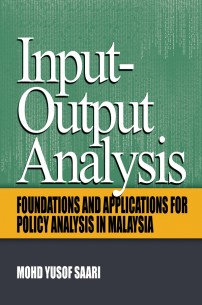Input-Output Analysis: Foundations and Applications for policy analysis in malaysia
Availability: 20
Author/Editor: mohd yusof saari
Extent: 264
Year of Publication: 2014
Economics is a system of interactions, and thus the evaluation and formulation of development policies require a general equilibrium model that captures the interdependencies among all the production sectors. Without such a model, it will be more difficult to carry out short- and medium-term planning exercises in a systematic manner, as it will affect the quality of policies and strategies to be formulated. This book is concerned with the foundations of input-output analysis and its application for policy analysis in Malaysia. The input-output analysis is an economic modeling technique that has the capability to capture interdependencies among production sectors at large scale analysis. Principally pioneered by Wasily Leontief, it has been used ever since in countless applications addressing questions on production, labour, social, trade, energy, resource use, industrial ecology, environment and regional science. The first part of this book introduces the basic understanding of the input-output system and provides the foundations for the modeling approach. The second part of this book discusses several applications of the input-output models for policy analysis in Malaysia. The applications include the interests of the current policy on the national, regional and international economies. However, the extensions on input-output analysis for social accounting matrix (SAM) and computable general equilibrium (CGE) models are not covered in this book.
Write a review
Your Name:Your Review: Note: HTML is not translated!
Rating: Bad Good
Enter the code in the box below:




